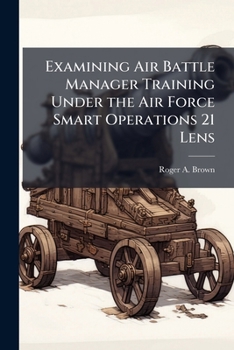Examining Air Battle Manager Training Under the Air Force Smart Operations 21 Lens
Select Format
Select Condition 
Book Overview
The study question "Can Air Battle Manager (ABM) training be shortened without a reduction in quality by applying AFSO 21 lean production principles?" is examined in two companion student Professional Student Papers (PSPs). This paper constitutes part one of the companion papers and covers the concepts and principles of AFSO 21, reviews the current state of ABM training syllabi, and follows with an application of AFSO 21 lean principles to the current ABM syllabi. The result of this paper is the finding that a single syllabus at a single base should be pursued. The focus of Part Two, the companion paper by Col Joseph J. Rossacci, addresses the feasibility of implementing the finding from this paper and addresses major variables associated with that finding that need to be considered. Finally, Col Rossacci's paper concludes with the recommendation to implement the findings of these two companion PSPs by consolidating Undergraduate ABM and E-3 Initial Qualification Training at Tinker AFB, Oklahoma. The business case for this consolidation is overwhelmingly positive as it would require an investment in infrastructure of approximately $6.8M, but would net the USAF a saving of $7M+ per year.
This work has been selected by scholars as being culturally important, and is part of the knowledge base of civilization as we know it. This work was reproduced from the original artifact, and remains as true to the original work as possible. Therefore, you will see the original copyright references, library stamps (as most of these works have been housed in our most important libraries around the world), and other notations in the work.
This work is in the public domain in the United States of America, and possibly other nations. Within the United States, you may freely copy and distribute this work, as no entity (individual or corporate) has a copyright on the body of the work.
As a reproduction of a historical artifact, this work may contain missing or blurred pages, poor pictures, errant marks, etc. Scholars believe, and we concur, that this work is important enough to be preserved, reproduced, and made generally available to the public. We appreciate your support of the preservation process, and thank you for being an important part of keeping this knowledge alive and relevant.
Related Subjects
Business Business & Investing Economics Education Education & Reference Engineering Technology




